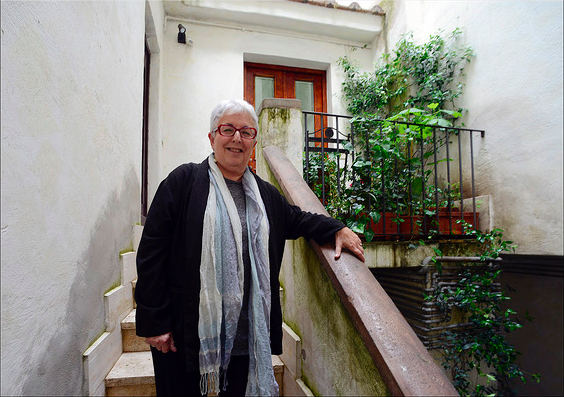Having trouble viewing this email? Click here


|
events The Turin Book Fair Honors Primo Levi  By Rossella Tercatin The Turin International Book Fair took place between May 9 and May 13, 2019. Many events were devoted to honor the centennial from the birth of the Turin-born writer and Auschwitz survivor Primo Levi. The 2019 edition of the Fair had been at the center of a controversy because a Fascist-leaning publisher had booked a stand there. Several speakers announced they would no longer attend the event until the stand of the publisher was revoked. |
|
News Prime Minister Conte at the Great Synagogue: "Antisemitism is Europe's suicide"
By Pagine Ebraiche staff |
|
culture The Auschwitz Memorial to Commemorate Italian Victims Reopened in Florence  By Adam Smulevich By Adam SmulevichThe Auschwitz Memorial built to remember the Italian victims of deportation found a new home in the city of Florence. Originally set up in a lager by the National Association of ex-deportees in Nazi camps in 1980, the monument was moved to Italy some years ago when the Auschwitz Museum contacted the Italian authorities to inform them that it no longer respected the standard of a modern museum, a new location was needed. This marked the beginning of a controversy behind which many have seen political motivations. To save the Memorial, which had also received a contribution by Primo Levi, the city of Florence offered its help along with the support of the Tuscany Region and other institutions, including the Union of Italian Jewish Communities. |
|
bechol
lashon - deutsch Schürzen und Disziplin 
Anna Foa* |
pilpul Being Vulnerable 
By Yaakov Mascetti* |
|
ITALICS Pope urged by Jews to take care  By AFP and TOI staff* By AFP and TOI staff*Pope Francis is being urged by experts to take greater care when referring to “hypocritical” Pharisees, a stereotype that fueled centuries of bad blood between Catholics and Jews. Catholic-Jewish relations blossomed after the Second Vatican Council — which in 1965 finally urged respect for Judaism — and Francis is a clear friend of the Jews, insisting the Church continue to apologize for anti-Semitism. But for centuries, Jesus’s Jewish origins were obscured and the Jews were held collectively responsible for his death. And the pontiff’s tendency to quote directly from New Testament passages where Jesus slams members of the small religious and political group as “hypocrites” has been troubling rabbis concerned about anti-Semitism. Some 400 Jewish and Christian Bible scholars gathered in Rome last week to exchange research notes on the Pharisees, a group about which little is known historically but which came to represent all Jews in Catholic tradition. To Jews, the Pharisees include some of the earliest of the Sages whose collective legal and spiritual debates over some seven centuries, until the fifth century CE, are recorded in the vast compilation called the Talmud, Judaism’s central post-Biblical text. But the image of the “treacherous” Pharisees appears down the centuries in dictionaries, academic articles, films and Protestant and Catholic preaching, with the word “Pharisee” becoming a synonym for hypocrite in the West. “They lacked life. They were, so to speak, ‘starched.’ They were rigid… The people didn’t matter to them: The Law mattered to them,” Francis said of Pharisees in a homily in October. *The article was published in The Times of Israel on May 12, 2019. |
 |


This
newsletter is published under difficult conditions. The editors of this
newsletter are Italian journalists whose native language is Italian.
They are willing to offer their energy and their skills to give
international readers the opportunity of learning more about the
Italian Jewish world, its values, its culture and its traditions.
In spite of all our efforts to avoid this, readers may find an
occasional language mistake. We count on your understanding and on your
help and advice to correct these mistakes and improve our publication.
Pagine Ebraiche International Edition is published by the Union of
Italian Jewish Communities (UCEI). UCEI publications encourage an
understanding of the Jewish world and the debate within it. The
articles and opinions published by Pagine Ebraiche International
Edition, unless expressly stated otherwise, cannot be interpreted as
the official position of UCEI, but only as the self-expression of the
people who sign them, offering their comments to UCEI publications.
Readers who are interested in making their own contribution should
email us at desk@ucei.it
You received this newsletter because you authorized UCEI to contact
you. If you would like to remove your email address from our list, or
if you would like to subscribe using a new email address, please send a
blank email to desk@ucei.it
stating "unsubscribe" or "subscribe" in the subject field.
© UCEI - All rights reserved - The articles may only be reproduced
after obtaining the written permission of the editor-in-chief. Pagine
Ebraiche - Reg Rome Court 199/2009 – Editor in Chief: Guido Vitale.
Special thanks to: Francesco Moises Bassano, Susanna Barki, Amanda
Benjamin, Monica Bizzio, Angelica Edna Calò Livne, Eliezer Di Martino,
Alain Elkann, Dori Fleekop, Daniela Fubini, Benedetta Guetta, Sarah
Kaminski, Daniel Leisawitz, Annette Leckart, Gadi Luzzatto Voghera,
Yaakov Mascetti, Francesca Matalon, Jonathan Misrachi, Anna Momigliano,
Giovanni Montenero, Elèna Mortara, Sabina Muccigrosso, Lisa Palmieri
Billig, Jazmine Pignatello, Shirley Piperno, Giandomenico Pozzi, Daniel
Reichel, Colby Robbins, Danielle Rockman, Lindsay Shedlin,
Michael Sierra, Rachel Silvera, Adam Smulevich, Simone Somekh, Rossella
Tercatin, Ada Treves, Lauren Waldman, Sahar Zivan.
Questo notiziario è realizzato in condizioni di particolare difficoltà.
I redattori di questo notiziario sono giornalisti italiani di
madrelingua italiana. Mettono a disposizione le loro energie e le loro
competenze per raccontare in lingua inglese l'ebraismo italiano, i suoi
valori, la sua cultura e i suoi valori. Nonostante il nostro impegno il
lettore potrebbe trovare errori e imperfezioni nell'utilizzo del
linguaggio che faremo del nostro meglio per evitare. Contiamo sulla
vostra comprensione e soprattutto sul vostro aiuto e sul vostro
consiglio per correggere gli errori e migliorare.
Pagine Ebraiche International Edition è una pubblicazione edita
dall'Unione delle Comunità Ebraiche Italiane. L'UCEI sviluppa mezzi di
comunicazione che incoraggiano la conoscenza e il confronto delle
realtà ebraiche. Gli articoli e i commenti pubblicati, a meno che non
sia espressamente indicato il contrario, non possono essere intesi come
una presa di posizione ufficiale, ma solo come la autonoma espressione
delle persone che li firmano e che si sono rese gratuitamente
disponibili. Gli utenti che fossero interessati a offrire un proprio
contributo possono rivolgersi all'indirizzo desk@ucei.it
Avete ricevuto questo messaggio perché avete trasmesso a Ucei
l'autorizzazione a comunicare con voi. Se non desiderate ricevere
ulteriori comunicazioni o se volete comunicare un nuovo indirizzo
email, scrivete a: desk@ucei.it
indicando nell'oggetto del messaggio "cancella" o "modifica".
© UCEI - Tutti i diritti riservati - I testi possono essere riprodotti
solo dopo aver ottenuto l'autorizzazione scritta della Direzione.
Pagine Ebraiche International Edition - notiziario dell'ebraismo
italiano - Reg. Tribunale di Roma 199/2009 - direttore responsabile:
Guido Vitale.
Realizzato con il contributo di: Francesco Moises Bassano, Susanna
Barki, Amanda Benjamin, Monica Bizzio, Angelica Edna Calò Livne,
Eliezer Di Martino, Alain Elkann, Dori Fleekop, Daniela Fubini,
Benedetta Guetta, Sarah Kaminski, Daniel Leisawitz, Annette Leckart,
Gadi Luzzatto Voghera, Yaakov Mascetti, Francesca Matalon, Jonathan
Misrachi, Anna Momigliano, Giovanni Montenero, Elèna Mortara, Sabina
Muccigrosso, Lisa Palmieri Billig, Jazmine Pignatello, Shirley Piperno,
Giandomenico Pozzi, Daniel Reichel, Colby Robbins, Danielle
Rockman, Lindsay Shedlin, Michael Sierra, Rachel Silvera, Adam
Smulevich, Simone Somekh, Rossella Tercatin, Ada Treves, Lauren
Waldman, Sahar Zivan.
